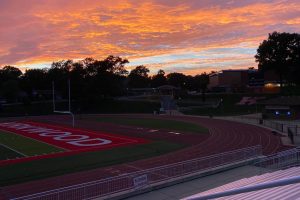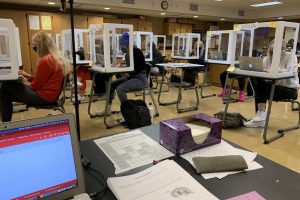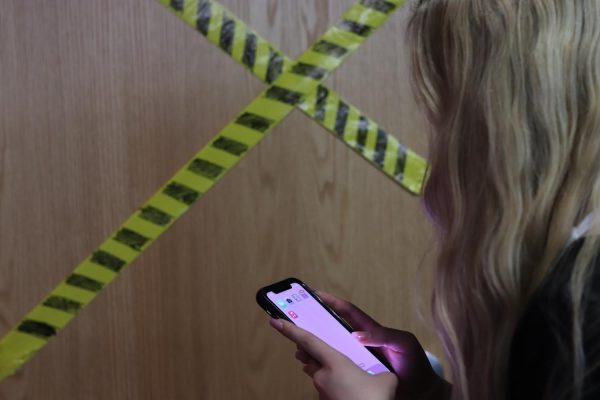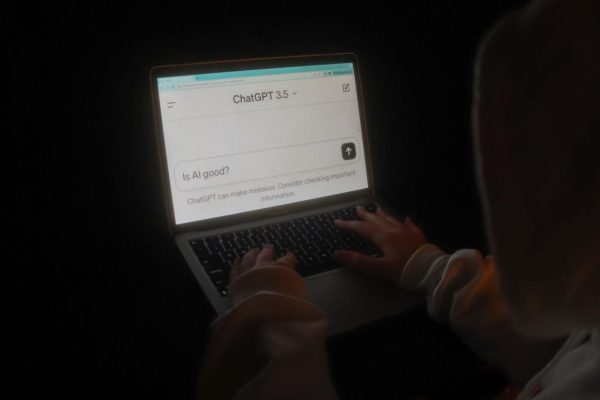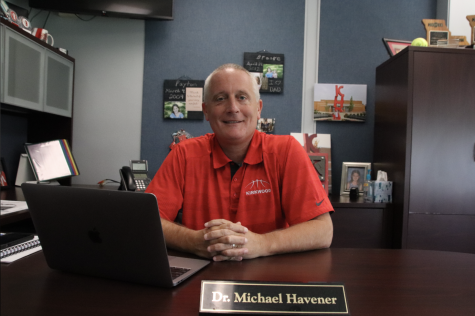Call Ed: Board, practice what you preach
Students may choose to be online or in person. They may switch from in person to virtual classes at any point.
The entire Kirkwood School District returned to campus beginning Nov. 9 after being online for seven months. Despite this drastic and sudden transition for students and staff, the leaders of our district — elected Board of Education members — have continued to host virtual meetings due to an outdated COVID-19 decision and are hesitant to reconsider. Of TKC staff, 87% (54/62) believe the KSD Board of Education’s decision to not reevaluate their COVID-19 policy to conduct in-person meetings until January is an ineffective solution which avoids dealing with their tech issues and fails to persevere through difficult times.
On Sept. 28, the Board of Education attempted a hybrid meeting where four board members were in-person and three joined via Zoom. Chad Kavanaugh, board president, described this meeting as an absolute nightmare. To reiterate, the basis of Kavanaugh’s decision to remain virtual was a result of technology issues. This was due to audio cutting out and people being excluded from the discussion, which proved to be a rationale for Kavanaugh deciding to delay reevaluation to January. A frequent audio difficulty during the September hybrid meeting consisted of in-person attendees hearing unmuted individuals through Zoom and in-person when a board member was speaking or had their microphone on. This created loud feedback sounds that both the board members and public could hear. These issues made collaboration amongst attendees difficult. Currently, board meetings are not expected to be in-person until spring or summer, says Kavanaugh.
Additionally, Kavanaugh expressed the concern of illegal voting during hybrid board meetings. According to Missouri School Boards’ Association (MSBA) policy, a voter must be visible at all times to guarantee the elected official is casting their vote. If a board member votes illegally, such as with their camera off, anyone can sue to retract a vote, making whatever the board approves illegitimate. Likewise, Kavanaugh said the decision to keep virtual meetings had everything to do with legalities, and nothing to do with COVID-19 health issues. According to Kavanaugh, board members want to be in-person if circumstances allow.
With technology problems being the main reason for virtual board meetings, we question this based on our own experiences and what we encounter daily. Board meetings are consistently about two hours, while the in-person school day lasts around four. Additionally, there are approximately 5,000 students enrolled in KSD where technology is heavily implemented. For the first quarter of school, Zoom acted as our classroom. We met with teachers over the computer for seven hours a day, while presenting projects, submitting assignments and having class discussions through Zoom. In a hybrid set-up, countless complications occur such as online students not being able to connect with their in-person classmates and poor audio quality. Students faced many setbacks regarding technology, and nonetheless we persevered. Yet, seven board members don’t seem willing enough to problem-solve and handle these issues.
There are about 900 in-person students at KHS versus a mere 25 attendees at a board meeting, including the presenters, public speakers and the cabinet. It’s clear that students are enduring the same issues on a larger scale. Students also deal with daily technology issues regarding Schoology, Zoom and emailing, among others. Instead of the board immediately throwing in the towel, they could have tried various options that accommodated their needs.
In the past, North Kirkwood Middle School’s spaced-out cafeteria served as a BOE meeting location. If the KSD board wants a space for their members to meet safely, seven board members attending in-person while the other attendees remain remote could serve as an alternative solution. This plan would solve the technology issues because voters would be in the room, while presenters could speak on Zoom, similar to a webinar. When discussing the possibility of utilizing NKMS, Kavanaugh expressed the BOE’s dislike of the cafeteria due to the awful acoustics. If sound quality is the only worry, the BOE could never live a day as a student, for we learn with similar commotion four hours a day, four days a week. Assuming that students are able to push through these obstacles, the leaders of our district need to rethink their decision to remain online for board meetings.
Especially in these times where struggle is universal, we need the BOE to persevere now more than ever. With lack of educational motivation and extreme change in school setting, students have faced many hardships this year. As virtual students learn from home all day, it’s challenging for many to stay focused and positive, especially with no social interaction. In-person students must deal with far apart desks, plastic dividers and hardly any connection with peers, making it difficult to enjoy school as opposed to before COVID-19.
If the decision-makers aren’t consistently reevaluating their COVID-19 decisions, it’s unacceptable of them to ask their students to endure what they could not. The hypocrisy by the Board of Education is evident, and we as students implore our leaders to reconsider their policies.
Your donation will support the student journalists of Kirkwood High School. Your contribution will allow us to purchase equipment and cover our annual website hosting costs.
This is the opinion of the entire Kirkwood Call staff.

She/Her
Hobbies and Interests: photography, piano, hiking, reading
Favorite song: New Year's Day by Taylor Swift
Favorite Quote: "To define...



